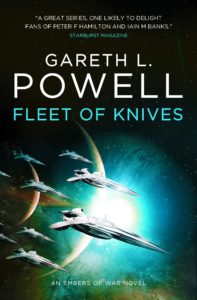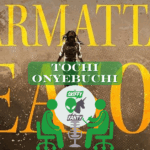Today on Skiffy and Fanty, we have an interview with Fleet of Knives author Gareth Powell.
GARETH L. POWELL is a speculative fiction author from the UK. He has won the BSFA Award for Best Novel and been shortlisted for the Seiun Awards in Japan. His novels and novellas have been published in the UK and US by Solaris, Titan Books, and Tor.com Publishing. His latest book, Fleet of Knives, has been shortlisted for the BSFA Award. He kindly answered a few of our questions about the book and his work.

1. Fleet of Knives is not your first sequel. What did writing Hive Monkey and Macaque Attack, sequels to Ack Ack Macaque, teach you to prepare you to write this sequel to Embers of War?
When I wrote Ack-Ack Macaque, I wrote it as a standalone novel, whereas the Embers trilogy was conceived and sold as a trilogy, so I already knew what was going to happen in books two and three while I was writing the first one, which made it easier to include foreshadowing and hints as to what was to come. But the one really good lesson I learned from Hive Monkey is that a sequel (especially a middle book of a trilogy) should turn everything from the first book on its head. Look at how The Empire Strikes Back inverted everything that happened in A New Hope.
2. With an expanding Space Opera universe full of aliens, places and references, how do you keep juggling all of that information and keep it straight?
It all exists in my head. I have no background notes or notebooks filled with sketches. Occasionally, I might have to flip back to check how I described a particular alien in an earlier chapter, but otherwise all those species and planets are just swirling around in my mind.
3. The novel opens on a set of alien ruins, and alien Big Dumb Objects were important in Embers of War. Why do you think alien ruins are so evocative to readers as a place? What draws you to them as a writer?
Our present Western culture has literally been assembled from the ruins of other civilisations. Our architecture, art, theatre, philosophy and literature all owe huge debts to the classical civilisations of Greece, Rome and Egypt. Some of our homes were built using stones from crumbling Roman villas. Many of the stories from the Christian religion can be traced back to the tales of Osiris in Ancient Egyptian mythology. For us, the idea of vanished forerunners is nothing new. During the Middle Ages, the Roman Occupation of England must have seemed like a vanished Golden Age, which became incorporated into the folk tales of Lost Camelot. In Europe, we are literally walking on the bones and crumbled buildings of those who have gone before.
4. Fleet of Knives revolves around a Generation Ship as a central location. What stories and novels inspired you in your own take on this classic setting?
There have been so many generation ship stories that the trope is something of a genre staple. The ones that immediately spring to my mind are Non-stop by Brian Aldiss and Eon by Greg Bear.
5. What is your favorite new addition to the EOW verse that you introduced in this novel?
I don’t want to give away any spoilers, but it was fun expanding Nod’s role in the story, and also charting the deepening relationship between two formerly antagonistic characters.
6. Writers are readers. So what are you reading lately, fiction or nonfiction alike?
Recently, I’ve been binge reading Peter F Hamilton’s Commonwealth novels, including the Void Trilogy and the Chronicle of the Fallers. I’ve also been hugely impressed with Aliette de Bodard’s novella, The Tea Master And The Detective.
7. Where can readers find you in upcoming events and cons, or online?
I can be found online at www.garethlpowell.com or on Twitter using the handle @garethlpowell.
This year, I will be at EasterCon in the UK, and at WorldCon in Dublin, and will be guest-of-honour at BristolCon in the autumn.
Thank you, Gareth!







